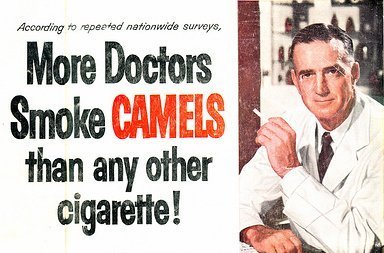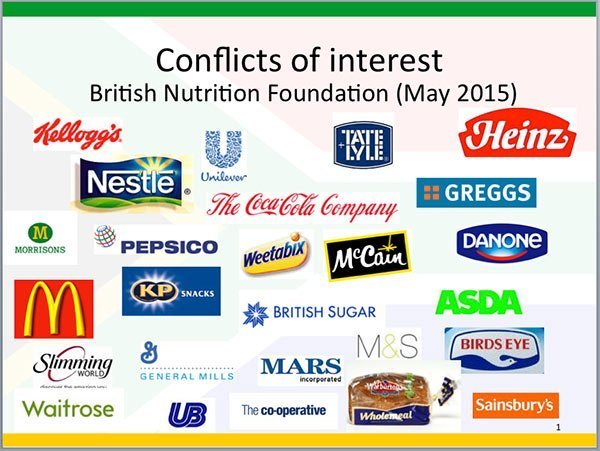We have never previously been subjected to so much nutritional advice as we are today. Most people feel confused by it all. It seems the more advice we are given the more we become obese, diabetic, cancerous and depressed. Who can we trust to provide the truth?
Can we trust the National Dietary Guidelines? No.
Official advice recommends a high-carbohydrate, low-fat diet. This idea gave us the obesity epidemic and the surge in type 2 diabetes. It recommends the avoidance of saturated fat and the use of ‘vegetable oils’ instead. These oils cause an increase in inflammation, which leads to a raft of metabolic problems.
Can we trust doctors? Not always
You may be surprised to learn that, in the past, doctors were being paid to promote particular brands of cigarettes. Doctors no longer do this, but their advice can still be heavily influenced by the huge marketing budgets of global corporations. Their training teaches them to prescribe drugs for your ailments. During their 5 years of medical education, they receive between 10 and 20 hours on nutrition.


Can we trust the Newspapers? No.
Newspapers exist to sell stories not to educate us. They will print information that works best for their business model. The Daily Mail always provides examples:
Daily Mail headline from 7th August 2019
‘Eating chicken instead of steak, lamb or sausages ‘slashes a woman’s risk of developing breast cancer by 28%’
Daily Mail headline 8th Sept 2019
‘Chicken ’causes cancer’: Oxford University scientists say people who eat poultry are at increased risk of developing deadly disease.’
Is it any wonder people are confused when they are told that chicken simultaneously causes and prevents cancer?
The Guardian is usually regarded as one of the ‘quality newspapers’. However, In 2017 an American organisation called the Open Philanthropy Project gave $886,600 to the Guardian newspaper, via its U.S. fundraising arm, Guardian.org. In return for the money, the Guardian runs weekly articles on the worst cases of poor practice and cruelty in animal agriculture. Why would they provide so much money? The Open Philanthropy Project is an investor in the company that makes the plant-based Impossible Burger. It is much more cost effective, and convincing, for companies to buy editorials than to place advertisements.
Can we trust search engines? It depends.
If you are confused about something, you probably look it up on the internet. If you are looking for information about eating meat, I suggest that you avoid Google and use a different search engine. The people running Google are invested in the new ‘plant burger’ industry and they have ‘adjusted’ the results of searches to suit their own interests. A search about meat, omnivores or herbivores on Google shows results more heavily biased to veganism than on other search engines.
When you ask a search engine a question, it does not set out to give you the correct answer: it gives you the answer which has worked its way to the top of their list. Vegan evangelists work hard to promote their ideas via ‘search engine optimisation’.
Can we trust organisations with virtuous names? Probably not.
‘People for the ethical treatment of animals’, or PETA, sound like a worthwhile group. Who doesn’t want animals to be treated ethically? However, this appealing name is a front for extreme, factually incorrect, vegan propaganda. If you put ‘are humans omnivores?’ into Google the top response (ignoring adverts) is a page from PETA’s website telling you that “while humans can eat a wide variety of foods we are anatomically herbivores”. As explained here, this statement is absolute nonsense.
‘Physicians Committee for Responsible Medicine’ is another American organisation with a virtuous name. They claim they are both ethical and responsible. It is actually a front for vegan propaganda. It promotes vegan diets for everybody and every age, including pregnant women. Vegan diets are incompatible with the optimum development of a human foetus and this organisation is therefore both unethical and irresponsible. Read more
The British Nutrition Foundation is a charity providing dietary advice in the UK. What’s not to like about a charity helping people to be healthy? As a charity, it needs funding, which it receives from the big names in the ultra-processed food industry listed below. How can it be impartial when its existence depends on these companies?

Can we trust our top Universities? Sometimes it is No.
In September 2019, BBC News reported that Cambridge University had replaced beef and lamb from the menu of its 14 food outlets with plant foods. Prof. Andrew Balmford said this had cut food-related carbon emissions by a third. Whilst claiming the virtuous higher ground by providing an inadequate diet, he failed to mention that over recent years Cambridge University has accepted £25.7 million in grants from the fossil fuel industry.
Can we trust rich celebrities? Absolutely not.
Richard Branson is a business man who has reached a kind of celebrity status. During 2019 he has been boasting how the meals on his Virgin Atlantic aircraft no longer include beef. He took this decision to reduce his carbon emissions. The irony is quite extraodrinary, especially when you realise that Virgin Atlantic is ranked 87th out of 112 airlines for having the least fuel-efficient fleet of aircraft.
Lewis Hamilton has been vegan for the last two years because he is worried about global warming. He seems to think that avoiding animal foods will off set the greenhouse gas produced by flying around the world in his private jet to race Formula One race cars. If he wants to be vegan that is his decision. What I object to with rich celebs is the way they feel obliged to lecture everybody else to copy their ill-informed decisions.
I take no pleasure in someone else's suffering, but Hamilton tweeted in October 2019 that he was so sad and depressed by the state of the world he 'could barely go on'. I am sorry to say that the nutrient deficiencies in a vegan diet are able to adversely affect mood and happiness, especially when the diet is followed for many years. Read more here.
Can you trust this website?
That is a good question. I encourage you to read the information here; think about it; and decide for yourselves if it makes sense. We are all having trust in our basic instincts eroded by the constant advice of 'experts'. The ability to think for ourselves and ask questions about what we are told is essential for our long term health. Please think about what I say and then use your brain and your instincts to come to your own decision.